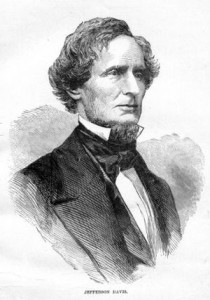 As winter drags on, food and supplies become an ever greater concern for the armies of the Confederacy. General Robert E. Lee, with President Jefferson Davis‘ approval, has already resorted to impressment to feed the Army of Northern Virginia, to the dissatisfaction of many local civilians. Yet the issue is far from resolved, and Davis is now casting about for other, hopefully less oppressive, means of meeting the logistical needs of the Confederate armies.
As winter drags on, food and supplies become an ever greater concern for the armies of the Confederacy. General Robert E. Lee, with President Jefferson Davis‘ approval, has already resorted to impressment to feed the Army of Northern Virginia, to the dissatisfaction of many local civilians. Yet the issue is far from resolved, and Davis is now casting about for other, hopefully less oppressive, means of meeting the logistical needs of the Confederate armies.
On the battlefield, little of consequence happens today. Much of what little action takes place occurs on the periphery of the war, in Florida. Federal forces withdraw from Gainesville following a skirmish with Confederate cavalry, while the U.S.S. Para escorts federal troops up the St. Mary’s River to Woodstock Mills on a mission to acquire a supply of lumber. A minor engagement with Confederate troops along the bank of the St. Mary’s does not deter the mission. Further northward beyond Florida, Union naval forces capture the Confederate blockade runner Pet off Lockwood’s Folly Inlet, Cape Fear, near Wilmington.
Meanwhile, Confederate Baptists remain concerned about the lack of Baptist chaplains in the armies of the Confederacy. While the subject is heavily covered, and often bewailed, in the Baptist press of the South, some secular newspapers of the South are also noting the disparities among denominational chaplains, as does today’s Galveston Weekly News:
The chaplains in Ewell’s and Hill’s corps, army of Northern Virginia, are enumerated as follows: Methodists, 28; Presbyterians, 15; Baptists, 10; Episcopalians, 7.
Far to the North in the United States, Baptists of New Hampsphire, distant from the theatre of battles, have the luxury of focusing on matters other than the war. In particular, the Baptist church in Rochester is in the process of raising funds to purchase a new organ, as the Rochester Courier notes in an article that also offers playful commentary on the theological diversity of Baptists:
Our Baptist friends held a Social Festival on Tuesday evening of last week, to procure funds to purchase a musical instrument, and notwithstanding the severity of the weather, met with perfect success. The ladies of the Society, having ordained a good time had entered into the spirit of the occasion with a perfect Free Will and as is usually the case when Free Will and Forordination go hand in hand, the good time came. The tables displayed beauty, taste and abundance, and in the regions below the bivalves furnished the luscious morsels ad libitum. While the Farmington Quartette Band discoursed sweet music the company were entertained with numerous and pleasing tableaux; the one entitled the Spirit of 76, where the parties were dressed in costume, with the old fashioned cotton cards and small flax wheel in full operation, seemed especially to please.
The fish pond furnished an unfailing supply of a greater variety than old Ik. WALTON ever dreamed of. Under the guiding hand of our friend E.C. KINNEAR the time passed pleasantly and of course profitably, (for we believe in the profit of pleasure) and the pretty little net gain of $175, was realized. We understand those having the matter in charge intend purchasing one of Mason and Hamlin’s $223 cabinet Organs.
The lack of food in the South contrasts starkly with New Hampshire Baptists’ food-laden festivities, offering a glimpse into the economic advantages that a yet-prosperous United States enjoys over a struggling Confederacy.
Sources: “This Day in Florida History,” Florida Historical Society (link); “North Carolina Civil War Sesquicentennial,” North Carolina Department of Natural Resources (link); Galveston Weekly News, February 16, 1864 (link); Rochester Courier, February 26, 1864, transcribed by and copyright New Hampshire Roots (link)


